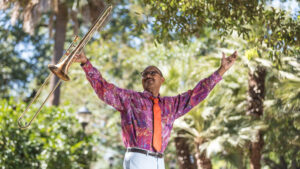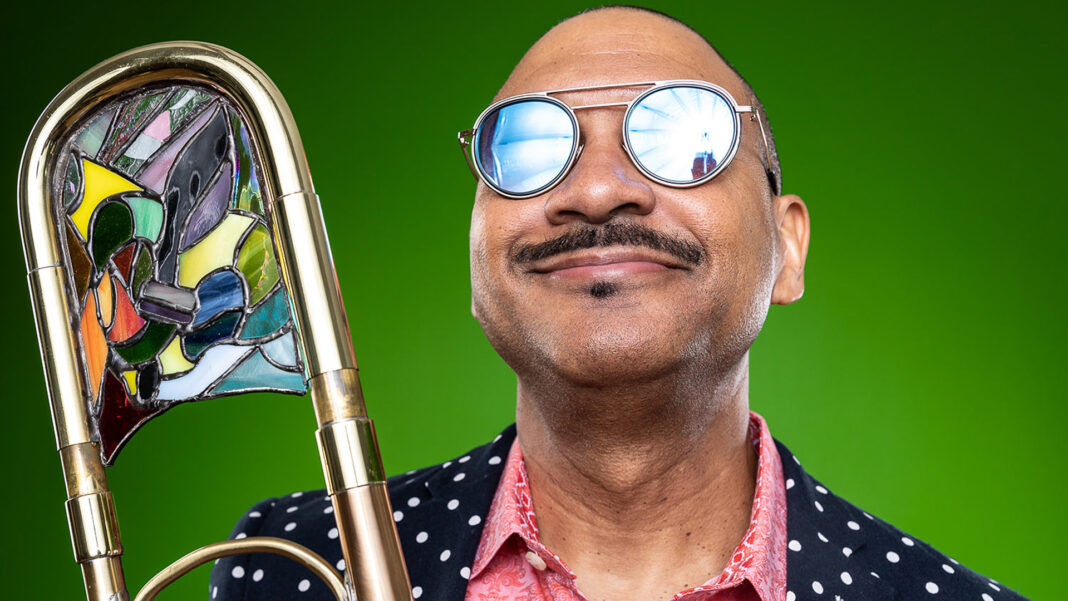
March 2nd was Ash Wednesday which, for some, signals the start of Lent. For others it marks the end of Mardi Gras. But the party can live on when jazz trombonist and composer Delfeayo Marsalis comes to town with The Uptown Jazz Orchestra as he is this weekend with concerts at The Broad Stage in Santa Monica on Friday; Soka Performing Arts Center in Aliso Viejo on Saturday and Yoshi’s in Oakland on Sunday.
If you don’t already know, Marsalis is part of that family of musicians that includes saxophonist Branford, drummer Jason and trumpeter Wynton Marsalis. The entire family is steeped in the tradition of jazz music, but Delfeayo is arguably the most passionate ambassador of the music from New Orleans.
As he told me recently during a Zoom call he wants everyone to have a good time. But that doesn’t mean he won’t throw in some thought-provoking compositions into the party. What follows are excerpts from our conversation with Delfeayo Marsalis that have been edited for length and clarity.
Mardi Gras will be over by the time you’re appearing on the West Coast. What excites you most about bringing this music out of New Orleans and to audiences around the world and seeing their reaction to it?
Everybody likes to party. Everybody wants to have a good time. Our message at this point is made. You can have a great time with a jazz band, with a jazz orchestra. We start off saying, “All right, everybody get up!” It’s a great thing to be able to interact with people. A lot of times in a popular [music] it can tend to sound similar, have the same kind of a feel for most of the show. I would say we’re like a 10-course meal. We have to work out it; this is how this is going to set up emotionally and this is what we’re doing. So it makes a great thing.
To make a modern comparison, you’re like the DJ at a party.
My show is designed to please the crowds. Somebody said, “Hey, you got a feel good band?” And I said “Why would you have any other kind of band?” Like why would you have a band that’s not designed to make people feel good?
From your perspective what makes this music so infectious?
The early music was composed and played for the people – the traditional New Orleans Louis Armstrong celebration. That’s because they called it happy days. The design of the music was that is was for the audience. And then somewhere along the 40s, in the fifties, I think we got the wrong message which is that the music is actually for the musicians and we have to be serious about our craft. And the audience is secondary. So that’s what it is about the New Orleans sound – just the celebratory nature of the African people. Really it comes back to the African folks. They come in Congo Square and that’s really where it all kind of happened. It’s the idea that now I have agency over what I’m doing for this small period of time. The rest of the week is going to be pretty jive. But right now I’m not worried about the rest of the week. I’m celebrating right now. That’s the message we’re trying to get out of here.
If one goes through the music you’ve recorded and performed it isn’t always about just having a good time.
There are serious matters, but it’s a question of how do we approach it. So from that standpoint ultimately the goal is for the audience to have a good time and to love what’s going on. And then somewhere in the middle of that we’re going to take a little venture off. I’ve written a song for Breonna Taylor. I’ve got The Notorious R.B.G. For Ruth Bader Ginsburg. We got one for Dr. Fauci. And one of my favorites is for a smaller group, Lost in the Crescent, which tells about sharecroppers and that kind of a job situation that occurred after the Civil War. It’s kind of like the set up: we are going to have a good time, but we can also add some other elements in there. I think that jazz music or American music really gives you that opportunity.
In 2013 you made a comparison between jazz and democracy on IRock Jazz Music TV. What role can your music or jazz play in uniting a horribly divided country?
It’s not going to happen, not to me, for a number of reasons. The Confederate officers were among the only individuals in history that managed to wage war against a country’s government and did not pay the ultimate price once they were defeated. And that single decision kind of paved the road for what we’re facing now, so it’s just always going to be here.
I hate to sound pessimistic about what is so ridiculously absurd. For years Black folk were the ones that, we put up with a lot for a lot of years and just was like, “No man, it’s cool.” It wasn’t enough to have to endure it. The ancestors had to assure the oppressive man it’s cool. Somewhere along the way, I think that actually was what was needed and what was necessary. But it’s kind of giving the wrong message for now. Today folks are like, if they’re not having their way there’s going to be hell to pay.
As far as democracy, we can bring anybody into the band. And as long as they have an open mind and they’re willing to to go beyond their normal scope, they can make it happen. So we’re looking forward to that.
People can come together at one of your concerts for two-and-a-half hours, unaware of any particular political leanings, and enjoy themselves in the company of one another. Then once the lights go on and the show is over, that unity disappears. That must frustrate you as an artist.

It frustrates me more as an American than as an artist. As an artist those two-and-a half hours that you describe, that’s what’s important, you know? But as an American, as a person that really believes in the democratic process and in democracy, it’s unfortunate to see folks who say, “Well, you know what? We’re going to define who Americans are and we’re going to say this democracy thing was cool when it benefited us.” But hold on now. It’s not really working.
So we’ve got to change the parameters. We have seen enough of this for so many years. But I look back at the way that the ancestors dealt with it. There’s a reason that Louis Armstrong was one of our greatest Americans because he came from the toughest place and he rode to the best place. Somehow when you listen to his music it manages to put you in a better mood. He never lost a perspective of who he was. And that’s what we’re always trying to do, not lose the perspective of who we are in the face of the madness that surrounds us. And that’s difficult.
George Bernard Shaw said, “Many a sinner has played himself into heaven on the trombone.” What would you most like to be playing on your trombone on your way to heaven?
You know trombone also has a slide, so you could equate the slide with the slippery slope in the other direction. Probably What a Wonderful World. It’s a song that Elvin Jones convinced me to play because he really loved Louis Armstrong. You know Louis Armstrong and Big Mama Thornton, those are his favorites. It’s not a song that I thought very much of, but I played it with him for so long and I understood what he understood. Which is that is a message we need to to get across as much as possible. And I think he felt that I could, hopefully, express that similar to how Mr. Armstrong did. Different, but with that same level of passion and conviction. So it would be What a Wonderful World.
To see the complete interview with Delfeayo Marsalis, please go here to our YouTube channel.
For more details on Delfeayo Marsalis’ three concerts, click on the links in the opening paragraph.
MainPhoto: Delfeayo Marsalis (Photo by Zack Smith/Courtesy DMarsalis.com)












